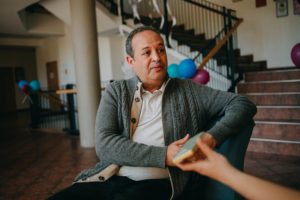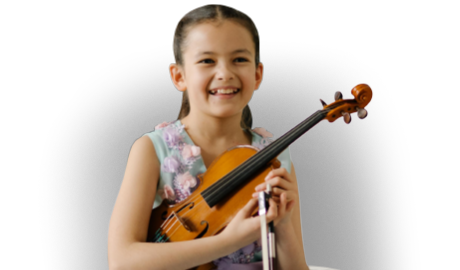 Tohle je vůbec poprvé, co působíte na KHS. Jak byste popsal atmosféru soutěže?
Tohle je vůbec poprvé, co působíte na KHS. Jak byste popsal atmosféru soutěže?
Je to tu skvělé v mnoha směrech. Nejprve bych chtěl vyzdvihnout kvalitu soutěžících, máme šanci zde slyšet mnoho talentovaných umělců. Zároveň cítím, že soutěž zprostředkovává i jistou vzdělávací hodnotu. Není to soutěž ve smyslu vítězů a poražených, ale každý má šanci něco vyhrát. I ti, kteří se neumístí na prvním místě, se mohou cítit oceněni a odnesou si cenné zkušenosti. Panuje zde výborná atmosféra a organizace je vynikající, vše běží jako hodinky.
Vnímáte velké rozdíly mezi soutěžícími napříč kategoriemi?
Samozřejmě že v každé kategorii jsou soutěžící jinak vyspělí, proto se také pokaždé zaměřujeme na něco jiného. Nemůžete totiž hodnotit sedmileté dítě stejně jako patnáctileté. V každé kategorii najdeme soutěžící, kteří jsou na svůj věk velice schopní, myslím, že zde letos máme i skutečné profesionály. A zároveň vidíme i variaci napříč národnostmi a hudebními školami.
Poznáte podle hry, že jsou soutěžící z jiné země?
Rozdíl mezi houslovými školami je rozhodně vidět. Například když někdo z ruské houslové školy učí ve Francii, nebo když někdo učí dle belgické školy v Izraeli, poznáte školu, ne zemi. Je to vždy poznat podle jiného typu úchopu, jiných technik i provedení.
Řekl byste, že mladší soutěžící hrají více uvolněně?
Těžko říct. Malé děti možná vnímají určité situace jinak, proto je jejich hraní odlehčenější. Jakmile začnete opravdu vkládat léta práce a úsilí do toho, co děláte, stres se stupňuje. Více si pak všímáte i malých detailů, které později mohou vyústit ve větší chyby. Samozřejmě najdeme soutěžící, co jsou na pódiu jako doma, ale i takové, kteří jsou více uzavření.
Zaujalo vás nějaké konkrétní vystoupení?
Bylo by složité porovnávat všechny soutěžící s jinými zkušenostmi a výběrem skladeb, proto nám práci usnadňují zavedené kategorie. Z té první bych chtěl ocenit všechna vítězná místa, soutěžící podali úžasné výkony. V ostatních kategoriích byly taktéž podávány fenomenální výkony, ovšem už bylo možné rozeznat dva tři soutěžící, kteří mezi ostatními vynikali.
Na co se nejvíce zaměřujete, když hodnotíte soutěžící, na techniku, emoce nebo něco jiného?
Je to kombinace vícero parametrů, navíc každý porotce se sám zaměřuje na něco jiného. U mladších soutěžících se snažíme odhalit, co na nich zanechali jejich učitelé, jestli se jejich styl učení odráží v hraní. S postupem času hledíme i na procítěnost a emoce. U starších soutěžících už se navíc zaměřujeme i na styl a techniku, tady už je vidět, jak se pocitová stránka slučuje s tou technickou.
Ve čtvrté kategorii jsme měli možnost slyšet i vaši žákyni. Bylo to pro vás výjimečné vystoupení, nebo jenom jedno z mnoha?
Bylo to něco víc. Řekl bych, že jsem byl nervóznější než ona. A i pro ni to byl významný moment, mít možnost hrát před mezinárodní porotou je pocta. Když hrajete na koncertě, víte, že tam je publikum, které si přišlo užít svůj čas. Ovšem na soutěží víte, že budete pozorováni a hodnoceni, jste pod větším tlakem. Já sám to také prožívám víc. Tady jsem měl možnost vidět nejenom, jestli hraje dobře nebo špatně, ale i jestli ta práce, kterou do jejího rozvoje vkládám, je někde vidět. Já byl s jejím výkonem nadmíru spokojen.
This is your first time at KHS. How would you describe the atmosphere of the competition?
I find it really nice in many ways. First of all, the level of the performers is very high, so there is an opportunity to hear some very talented players. At the same time, I feel that there is an educational value transmitted through the competition. It is not a traditional competition with winners and losers but everybody wins something. So even those who do not place 1st feel appreciated and they can take something from the experience.
The atmosphere is wonderful, the organization is great, and everything is on time.
Do the levels of players change throughout the categories?
Of course, the level of maturity is different in every category, and we also find different things to listen to in each of them. You cannot judge a 7-year-old and a 15-year-old the same. In each category, there are contestants with a high level of skill for their age, I would say we even have some real professionals here. And there is also so much variety with different nationalities and schools.
Can you tell when the players are from different countries?
I can tell the different violin schools. It is always obvious when, for example, someone from a Russian school teaches in France, or someone from Belgian school teaches in Israel. It is very clear here with different types of holding, techniques and interpretations.
Would you say that the younger ones are more emotional?
I am not sure. Maybe small children understand certain situations differently and play more freely. But as you invest more in what you do, the pressure goes up. Then, you are more aware of the small details that make big differences. There are some contestants who love the stage more and some who are really introverted, it really depends on the personality.
Do you have a favourite performance so far?
It’s very difficult to compare players with different experiences and compositions, that is why we have those categories. So if I had to choose from the 1st category, I would say all the winners played exceptionally. In the remaining categories, the average level was really high but I could already recognize two or three players that were very impressive.
What do you focus on the most when you evaluate performances – technique, emotions, or something else?
It is a mix of parameters. Every jury member will also focus on something different. With younger students, I was looking for a trace of their teachers, something they left on them of their own teaching. And as they progress, I look for their feelings and emotions. With the older ones, you look for styles and techniques, it is the place where emotions connect with the physical aspect.
In the 4th category, we had the chance to hear your student. Was it special for you to hear that or was that just one of many other performances?
I would say it was special. I think I was more nervous than she was. It was also a special moment for her – to play in front of an international jury and such. At a concert, you know there is an audience who came to enjoy themselves. But at a competition, you know you are judged, more pressure. I myself am also sensitive to that. Here, you do not only see whether she is good or not, but whether the progress we are trying to implement is working. And I was satisfied.

